Why Do Cats Purr? (It’s Not Always Because They’re Happy)
Is there anything more relaxing than the sound of a cat purring? But, why do cats purr?
Whenever I’m sad or sick, there’s nothing better to me than lounging on the sofa with one or both of my cats snuggled close. The sound of their contented hum combined with the soft vibration against my chest or legs is better than any meditation.
What you may not realize is that purring is the most common sound for a cat – even if you don’t hear it all the time. Yet, most of us don’t know much about purring.
We assume that a purr is a cat’s sign of contentment, because they often do it when they’re getting a particularly good head scratch, or their favorite meal.
However, you shouldn’t always assume that purring means your cat is in a good mood.
If you pick your kitty up and hold him close, he might be purring because he likes it – or he may be purring because he’s anxious and wants you to let go.
So, how do you figure out why cats purr?
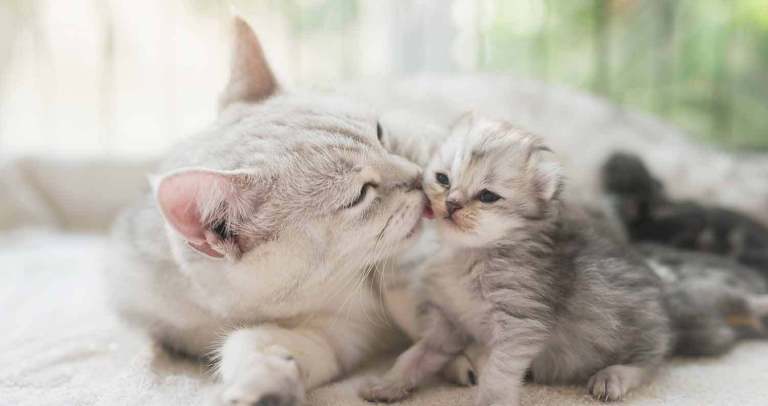
Purring is a Kind of Communication
Cats express themselves by purring.
Just like chirping, meowing, or chattering, purring is first-and-foremost, a way for your kitty to express themselves. However, unlike a dog wagging its tail, a cat purring doesn’t always indicate a good mood.
Your moggy is a pretty mysterious creature.
For instance, did you know that your cat spends 70% of its life asleep?
Although scientific research into our feline friends is still ongoing, studies suggest that cats purr when they’re happy, but also when they’re afraid, or stressed. Purring is a kind of defence mechanism, and a way for your cat to remain calm when they’re stressed.
Just as your cat’s purring can make you feel calmer, it helps to soothe them too. That’s why a lot of cats purr on the vet’s table – even when they aren’t happy.
Purring is more than just a method of non-verbal communication. Cat’s use their purring to soothe and manage pain. Mother cats frequently purr during labour! What’s more, a mom cat will continue purring after her kittens are born. This leads the kitties to their mother’s body for nursing. Remember – kittens are born deaf and blind.

How Do Cats Purr?
Before we jump into a deeper assessment of why cats purr, let’s get to the science about how cats purr and make such a unique sound.
Research demonstrates that your cat’s muscles are responsible for purring. The diaphragm and larynx muscles work in sync as your cat purrs, to create a sound as they inhale and exhale. It’s difficult to say how the central nervous system in your kitty controls these sounds, however.
According to experts, the purring sound comes from signals in your cat’s brain that prompt an involuntary reaction. It’s just like you laughing when you find something funny or smiling when you’re happy.
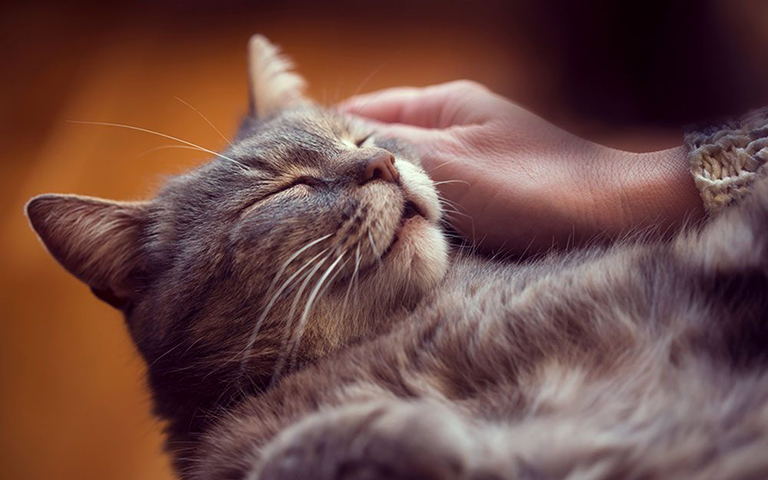
Why Do Cats Purr? The Basics
Purring is common when your cat feels friendly or relaxed. However, it’s also something that can happen when your pet is stressed, hungry, in pain, or anxious. The fact is that all cats are different. You’ve probably noticed that different moggies have different personalities.
In the same way, all behavior from your cat will depend on the context and that cat’s history. Getting to know your cat on a deeper level makes it easier to figure out whether your cat is purring for anxiety reasons, depression, or something else entirely.
Purrs release feel-good chemicals for your cat – just like running and exercise creates endorphins for humans. Experts think that cats use these vibrations to soothe themselves. This could mean that your kitty is trying to calm their nerves when they’re snuggling, or that they’re just enjoying the experience.
Studies found that whole-body vibrations at a certain frequency in a cat’s body can also increase the chances of your kitty healing and overcoming ailments. It sounds pretty weird, but even astronauts from NASA have used vibration therapy to support bone density and keep them comfortable in space.
Higher frequencies of purring serve their own unique purpose too. One study in the Current Biology journal found that cats purred louder when they were trying to get owners to feed them. Interestingly, the vibrational frequency of a cat’s purr, when they want to be fed, is around 220-520 HZ.
That’s awfully close to a human baby’s cry of around 300 to 600 HZ.
Here are some of the most common reasons why cats purr.

1. Crucial Communication Between Cats and Kittens
Purring is crucial for the survival of newborn kittens. Remember, they don’t have any vision to help them out when they’re trying to find their mom for food. A mom’s purr guides her kittens to her with soft vibrations. Even though the kittens are deaf, they still feel the purring.
The adorable vibrations that happen between kittens and their moms are kind of like homing devices. They keep the momma cat and her baby cats connected. Kittens start purring in return when they’re about 2 days old, showing their contentment for the food.
In the wild, the purring communications between a cat and her kittens are pretty clever too. Since purring isn’t as noticeable as meows and cries, it doesn’t attract predators.
Another bonus? Purring helps kitties to heal (we’ll come back to this in a minute). When a mother cat is giving birth and recovering after labor, she’ll use purring to release endorphins and reduce pain. Once again, in the wild, this means that the kitty doesn’t attract any predators when they’re in a dangerous environment.
2. Cats Purr for Attention
You might already know that cats generally only meow when they want the attention of their humans. It’s not as common for cats to meow when they’re communicating with their fellow felines. However, cats do purr for attention – from other kitties, and from you.
Cat parents are often familiar with the adorable little vibrations of their kitties when they cuddle and stroke them. These little fluff balls exude contentment to let you know that they like what you’re doing. Most kitties also recognize the obvious benefit of purring.
The more your kitty purrs, the more likely you are to give them attention and love. This means that they get more of what they want from you whenever they purr.
As we mentioned above, when some cats want food or extra attention, they’ll also purr a lot louder. This is something that researchers call the “solicitation” purr. The normal-sounding purr converts into a more urgent sound that mimics a crying baby.
3. Cats Purr for Extra Exercise
This might sound like a strange thing – but bear with us. Cat purring is a kind of low-key exercise for kitties in some circumstances.
A cat purring might not look like it’s experiencing as much physical strain as a human in a yoga session, but they are getting a form of low-intensity exercise. As you’ve probably noticed, your feline friend is fairly good at preserving energy.
Our fluffy pals use naps and lounging sessions to avoid over-exerting themselves. However, they do need regular exercise to keep them healthy. Researchers have found that vibrations from purring are great for stimulating the muscles and bones – without too much effort.
If your little purr machine is chilling out on your sofa, vibrating away, then they might be getting some extra exercise in their schedule.
4. Cats Purr to Heal
Here’s one of the most interesting reasons why cats purr. The lowest frequency of a cat purring causes vibrations in the body that are effective at easing breathing, healing injuries, and building muscle. At the same time, your cat’s purring releases endorphins which act as a kind of pain relief.
A cat’s purr vibrating at around 25 to 150 Hz is the same frequency that scientists use in vibration treatments for increasing bone density and healing. If you’ve ever wondered why cats can easily jump huge distances, remember that they’re always topping up their bone strength.
Although not all cat purring delivers the same healing benefits, lower-frequency purring is excellent for improving bone healing and relieving muscle pain. Human clinical trials into people receiving ultrasound treatments with similar vibrations show that low-frequency sound accelerates the healing of fractures.
Can All Cats Purr?
Although there are a lot of different kinds of cats out there, from the Maine Coon, to the Serval and the Ocelot, it’s worth noting that every cat is different. Not all cats can purr. This soothing vibration usually appears in domestic big cats purring and certain wild cats.
In general, cats that can’t roar can purr, and cats that can roar can’t purr. Essentially, that’s because the throat and muscles of these cats are made differently. In bigger, roaring cats, like lions, there’s a small flexible bone in the vocal cord, which makes a bigger and deeper roaring sound.
The same bone exists in smaller domestic cats, but it’s completely hardened. This means that your household cat can only make slight vibrations while they inhale or exhale.
Interestingly, there are a handful of “larger” cats that can purr and roar too. For instance, in a review conducted in 2002, 20 out of 36 cat species had the ability to purr. Lions and leopards could both purr in some cases during this trial– although some claim that the sounds the big cats made were low-key growls.
According to the current knowledge we have, “true purring” is more likely to belong exclusively to smaller cats, while bigger cats just make a similar noise.
The research is still ongoing into which cats can purr and which can’t. The good news is that most domestic cats definitely can purr, and often will.

Why do Cats Purr and then Bite You?
The million dollar question. It does seem a little odd to us that one minute our beloved four legged friend is kneading us, licking us, being loving and the next they are biting us.
Admittedly, it is generally only a playful bit (that can also hurt!) but why do they do it? Well, we have looked into this and written an article all about why do cats purr and knead and lick and then bite you! Check it out!
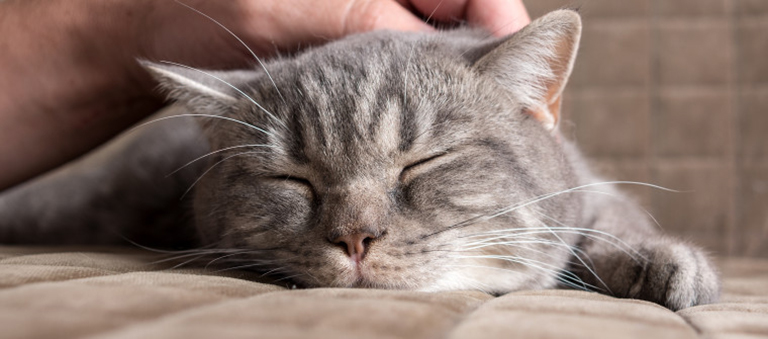
Why Does Your Cat Purr When You Stroke Them?
So, here’s the biggest question for most cat parents, how do you know why your kitty is purring?
Now that you know a purr isn’t just a sign of contentment, you may want to be extra aware of what different purrs mean for your kitty. A purring cat can be happy, but they can also be stressed, in pain, or even just hungry.
Since often, a cat purr will be an attempt to communicate with you, it’s only fair that you try to understand what your moggy is saying. However, keep in mind that it can be difficult to tell what your kitty is thinking.
The good news is that contentment and happiness are still the primary reason that your cat will be purring. More often than not, if you hear those little vibrations, it’s because your cat is in a great mood, or you’re doing something right.
The best way to determine whether something is up with your furry friend is to check the context of the situation. If it’s close to your moggy’s dinner time and they’re making a real racket with their purring, they’re probably just telling you that you’re hungry.
If your cat is purring, but she’s also nipping at you or swiping with her claws when you try to pet her, then she’s probably annoyed or angry. This is a good sign that you should probably take a few steps back and leave your cat alone.
Always keep an ear out for consistent vocalization from your cat. This sound could be in the form of purring, meowing, or even growling noises. If your cat is making constant sounds for an extended time (more than 24 hours), this indicates that there’s something wrong.
If you notice that your kitty isn’t eating or drinking properly at the same time, then you may need an urgent trip to the vet to see what’s up.
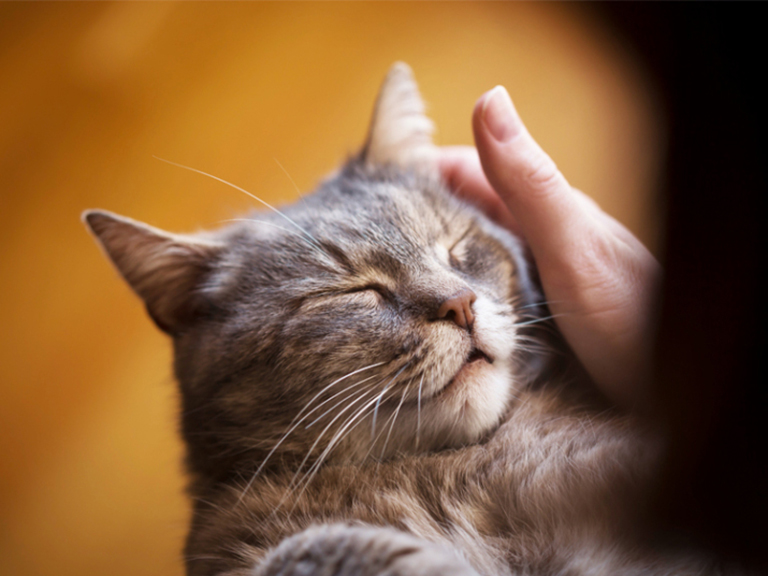
How Cat Purring is Healing for Humans
If your kitty is purring because he’s happy, and you know that for certain, then a purr can be a wonderful thing. It’s a sign that you’re doing a good job as a pet parent, first and foremost. And all pet owners want to know that their furry friends are happy.
However, there’s another bonus to having a content and purring cat around the home. Purring isn’t just a great way for cats to heal themselves – cat purring is healing for humans too. Studies indicate that cats do a much better job of relieving stress and high blood pressure than any other pet. (Take that dogs).
A study conducted over 10 years at the University of Minnesota Stroke Center discovered that people with cats were around 40% less likely to have heart attacks. A cat’s purring is a kind of auditory stimulus for humans; it makes us feel calmer and more content. This reduces stress levels and blood pressure, so you’re less likely to suffer from ailments.
Turns out that your kitty is better for your health than you might think.
Research into cat purring healing power is still ongoing. Many people believe that being around a purring cat can help you to get over an illness quicker or boost your immune system. Some pet parents also find that cat purring is great for migraines.
Cats spend a lot of time laying around, waiting to hunt, and stimulating their bones with purring vibration. The same kind of vibration is also helpful for humans. Purring devices are already appearing in the healthcare industry, allowing for better physical therapy sessions.
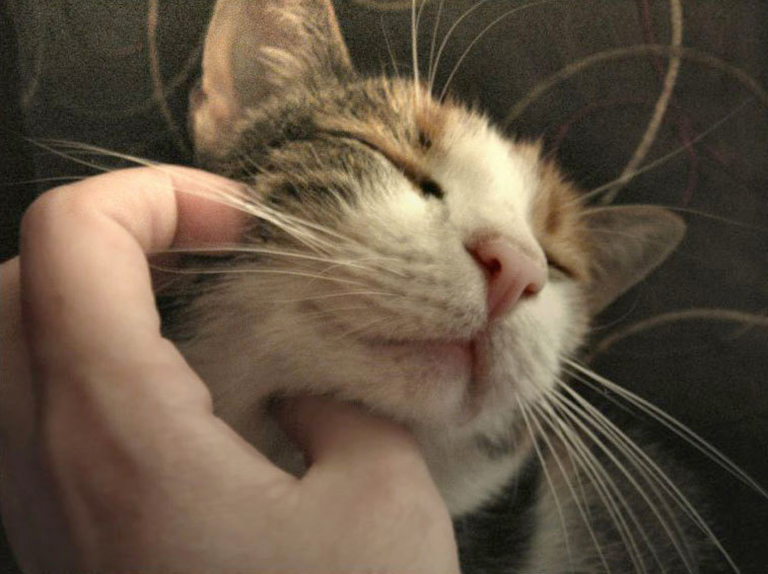
What if My Cat Doesn’t Purr?
Cat purring is usually a pretty great thing for felines and their companions. So, what does it mean if your cat virtually never purrs? First of all, don’t panic. Each cat is different, and many purr at different volumes and frequencies. Some cats are incredibly quiet when they purr. The only way you would notice that these felines are purring is to touch their throat.
Other cats seem as though they don’t purr at all. Scientists are trying to understand why this happens, but we’re still not sure. Feral cats are more likely to purr less than domestic cats. Some scientists think that feral kitties are taught by their parents to reduce purring in order to avoid predators.
Scientists have also found that feral cats are usually less vocal in general than domesticated kitties. They don’t develop the habits of purring and meowing as much in their early lives, so they don’t continue it in adulthood. This could be because domestic cats have developed their vocal abilities over the years to communicate better with humans.
The only real reason to panic about a cat not purring is if you’ve noticed they haven’t been doing it for quite a while, and they’re showing other signs that something isn’t right. If your cat isn’t eating or drinking properly, they’re vomiting, or they’re struggling with going to the bathroom, seek advice from a vet.
A lack of a purr isn’t necessarily a sign that something’s wrong with your cat. Remember, cats usually purr to heal! However, any change in behavior in a kitty is usually worth exploring.


